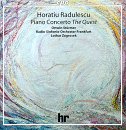A beautiful spectralist Christmas!
Christopher Culver | 12/22/2008
(5 out of 5 stars)
"This is a magical disc, and one especially appropriate for reviewing in the holiday season. The Romanian composer Horatiu Radulescu (1942-2008) settled in France at a fairly young age and wrote decidedly forward-looking music. In a typical Radulescu piece, spectral energy is distributed among instruments and gradually shifts, producing some impressive clouds of sound. So begins his Piano Concerto (1996), performed here by the Frankfurt Radio Symphony Orchestra conducted by Lothar Zagrosek, with Ortwin Stuermer as soloist.
But a few minutes into this halo of timbres, a remarkable melody pops up, a quotation of a Christmas carol from the Maramures region of Romania. The concerto develops as a reconciliation between Radulescu's technical developments and peculiar spectralist mysticism and the rich heritage of his native land. All in all, 18 Christmas carols are subjected to all manner of spectral variations, some exceedingly subtle where the original tune is drowned entirely (the second moment and fourth movements), and many rich and strange but with the carols' identity maintained (the first and third movements). Some have called this "Radulescu lite", but I think that's an unfair appelation. True, the piece resembles ordinary concert repertoire to a (vague) degree, and the Christmas carols provide an almost constant melodic basis, while most of Radulescu's output eschews traditional melody. Nonetheless, the Piano Concerto is a boundlessly deep creation where one discovers all kinds of new timbres and interconnections on re-listening. The piece also stands as a monument of how spectralism can be convincingly wedded to the musical heritage of the (pre-)tonal era, something rarely attempted (through Grisey's "Vortex Temporum" comes to mind).
Though a live recording, this is a admirably well-engineered disc with the whole orchestra elegantly balanced, and the performers seem quite self-assured. The liner notes are very informative on Radulescu's mystical philosophy, passionate and exhuberant but much easier to swallow than Stockhausen's. Though one may have to be in the right mood to open up to this concerto, I'd never rate it lower than four stars, and I highly recommend it to lovers of both out-there modernism and fans of contemporary tonal works."


 Track Listings (4) - Disc #1
Track Listings (4) - Disc #1